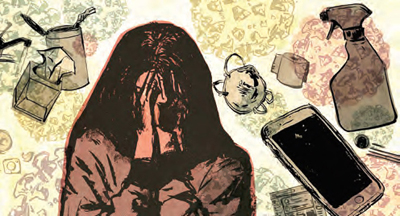
CORPORATE CITIZEN CLAPS FOR THE CHANGE INITIATED BY NASHIK-BASED CHANDRA KISHORE PATIL THAT BEGAN SOME FIVE YEARS AGO URGING PEOPLE TO STOP POLLUTING A STRETCH OF INDIA’S ‘DAKSHIN GANGA’ IN HIS VICINITY

His socially conscious act finds a new meaning with each passing year, especially during the Indian festive seasons. The Godavari, also referred to as ‘Dakshin Ganga’, with its source in Trimbakeshwar, Maharashtra, takes pollution hit every year like other water bodies nationwide during the festival season as people thoughtlessly dispose of so-called ‘holy’ remnants after worshipping of deities and other ‘pooja related’ materials. These are often disposed of in plastic bags wreaking further havoc on water ecosystems. Most recently, Patil’s pictures were tweeted by one IFS Officer Boddu showing him standing on a bridge with a whistle in his hand as many plastic bags lay beside him on the ground. Hailing from Nashik’s Indiranagar area, Patil has been standing beside the river from morning till 11 pm, alerting people not to throw garbage in the river. “Many behave rudely with me, but I still pursue them not to do such things,” said Patil. “I’ve been doing this every year for five years now. And will continue doing this till my health permits. The accumulated waste then gets collected by the municipality and taken away to a separate dump yard,” he said. For generating awareness amidst resistance from people, Patil also fills bottles with the river water, asking them to taste it and when they refuse, he makes them aware of the severe pollution in the river. While netizens have hailed him, twitterati known to him, have commended on his other social activities in the past 12 years collecting idols and photos of Gods abandoned in temples and deposits it with the Nashik Municipal Corporation (NMC). He is also involved in motivating ‘Clean India’ and plantation drives amongst children. When will citizens exercise their moral right for a permanent safer disposal system and appease the mythical river Goddesses too?
CORPORATE CITIZEN SLAPS THE STEP-MOTHERLY TREATMENT METED OUT IN REVIEWING MENTAL HEALTH GUIDELINES POST THE COVID-19 OUTBREAK


Despite the magnitude of mental health hazards, little has been done to stave off the rise of the mental ‘pandemic’. As the diaspora of new cases add up, they are viewed as ‘normal’ or is it? The regular teenager who is unable to sustain attention in day-long online classes, the 10-year-old unable to go out and play with friends, the engineer or professional suffering redundancy or senior citizens unable to connect to a more ‘virtual world’. “A rise in frustration, unhealthy lifestyle and excessive use of gadgets is the prominent behavioural change seen in kids,” said Psychiatrist Dr Anjali Chhabria. The National Crime Records Bureau (NCRB) states that more than one student commits suicide in India every hour, with about 28 cases reported daily. While governments worldwide are addressing issues of suicide prevention, giving top priority to mental health and setting aside funds, the same eludes India. Australia has reserved AUD $48.1 million National Mental Health and Wellbeing Pandemic Response Plan while the U.S. has pledged $425 million for Substance Abuse and Mental Health Services Administration (SAMHSA) programs. But “The Indian government has stated that there has been no study conducted to evaluate the mental health effects of Covid-19. We pay mere lip service to mental health in a country where there are 150 million-plus Indians who suffer from common and mental health illnesses pre-Covid. The post-Covid world has resulted in this increasing manifold,” said Nelson Vinod Moses, Founder of SPIF (Suicide Prevention India Foundation), Bengaluru. SPIF data states that nearly 65% of counsellors have observed an increase in people who have self-harmed, about 71% said that more people have expressed suicidal tendencies, or a death wish post the outbreak. 54.7% of therapists said that there has been a rise in first-time therapy seekers and that caregiver fatigue has heightened according to 62.3% of therapists. Anxiety (88.7%), job loss or fear of job loss (76.1%) and stress 73.6%), isolation/loneliness and financial insecurity (73% each) top the list of common problems faced by people as reported by therapists. Is this a wakeup call or not?